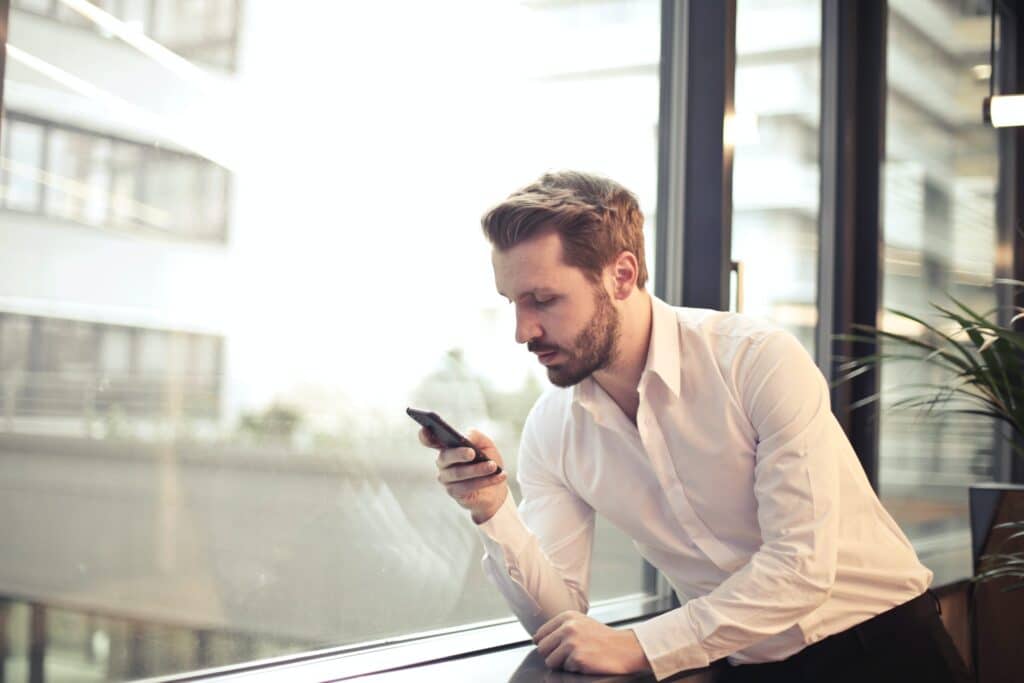Pros & Cons of Using Smartphones for Legal Work

Smartphones, for many legal professionals, are a blessing just as much as they are a nightmare for other legal professionals. Regardless of which side of the spectrum you land on, two things are pretty much certain: (1) smartphones are here to stay; and (2) no matter how much you may resist it, you will likely use your smartphone to perform some kind of legal work.
The key to finding a balance where you can live with your smartphone and not get burnt out is twofold: (1) knowing the pros and cons; and (2) applying that knowledge to legal work. Knowing the benefits of smartphone use for legal work will help you optimize your time accordingly. Likewise, understanding the negative aspects of smartphone use to perform legal work will help you set boundaries to avoid unnecessary exhaustion.
Pros & Cons of Smartphone Use for Legal Work
Because of our mobile devices, like smartphones, we live in a world where everyone thinks everyone is available 24/7––no exception is made for lawyers and their clients. This perception comes with its advantages and disadvantages.
Smartphones & Productivity
Smartphones are great for productivity––to an extent.
The Pro
The flexibility of smartphones manifests as productivity. While on a plane or train, you can check emails and, if necessary, respond rather quickly. That’s a great thing, of course. If you have an app on your phone that grants access to your legal matters, then you can get quite a bit of work accomplished. For example, with the Lupl app, you can review what’s happening in real-time in any one of your legal matters. You can delegate tasks, share documents, execute documents, and collaborate with colleagues. You can, indeed, be productive because, in sum, smartphones offer greater flexibility, enhance workflows, and improve performance during the time that had once upon a time been downtime.
The Con
It’s when you constantly check your smartphone that it becomes a hindrance to productivity. We get it. After all, who can’t help to check their phone every other minute when a notification sounds? You don’t want to miss a thing. Even when you have your computer right in front of you, people still reach for their phones to check emails or whatever else is dinging or ringing. This behavior continues well after lights are turned off in the office, while at home having dinner, even after retiring for the night. What’s more, sleeping with that phone by the bed with its blue light interferes with sleep, so you wake less rested. Even then, the first thing you may do when you wake is reach for your phone. Over time, this behavior wears and tears on your mental and physical well-being––and that’s what studies on the use of smartphones say, not us.
The Balance
As a Harvard Business School professor, Leslie Perlow conducted research on smartphones and work productivity, which is detailed in her book “Sleeping with Your Smartphone: How to Break the 24-7 Habit and Change the Way You Work.” She found that 78% of participants were happier and more productive when they took at least one night off from their phones. On the other hand, of the workers who did not take time off––and again, this was only for one night––only 49% felt happier and were more productive. All of this may be common sense, but it’s hard to take one night off let alone several nights off when you’ve been conditioned to check your phone.
But boundaries are necessary. Make time in the evening to put the phone down and be present in your personal life. Keep the phone out of the bedroom and get actual sleep at night. Make small changes and pay attention to how that impacts your productivity as much as your overall well-being.
Smartphones & Ethics
Ethics is an important part of the legal profession. As a legal professional, you know you must adhere to these rules on ethics if you want to remain in the profession, and that’s true in most jurisdictions across the world. Two important pieces of ethics that apply to smartphones specifically involve competent representation and confidential client information.
Competent representation refers to your use of adequate skill and legal knowledge and to provide thorough and well-prepared representation. There’s a growing trend that the definition of competent representation includes legal tech, too. As for confidential client information, legal professionals must keep client assets and work product confidential. Part of this requirement includes storing it in a safe place where it won’t be inadvertently leaked or mishandled. Smartphones offer a means to comply with these ethical obligations, but it comes with risks.
The Pros
Smartphones today benefit from the most advanced technology in history. According to American Bar Association (ABA) TechReport 2020, most lawyers use iPhones, and these smartphones receive regular security updates. Further, when certain legal apps or platforms are downloaded on a smartphone, an attorney can provide valuable services to a client when not in the office. For example, a document must be executed and filed promptly. The client just signed it and sends you an email of the same. With your smartphone, you can respond timely and appropriately without delay.
The Cons
Smartphones don’t always stay the smartest and most secure. Updates are always required, but updates aren’t always completed or, for some smartphones, updates stop, i.e., the maker no longer provides updates for the specific smartphone software. Plus, smartphones are small and easily lost or left behind, at which time they become vulnerable to theft and hacks. With regard to hacks, the apps you download on your smartphone can present more opportunities for malware, ransomware, and the like.
The Balance
iPhones tend to be the preferred smartphone by most lawyers. That’s a good thing because they have been and continue to be the most secure smartphones on the market. You should always make sure your phone is updated. You should use a code to log into the phone. And, you can use technology or tech devices to keep track of your phone’s location and report it if it goes missing.
Smartphones & the Work/Life Balance
Smartphones are important. They offer flexible ways to be more productive and to comply with ethical rules. But their presence in our lives is omnipresent. As already mentioned, that can take a toll on your work/life balance.
The Pro
There’s that flexibility word again: smartphones make work flexible, and that can mean greater work/life balance. You go on vacation, and you can still stay involved in work with your smartphone. You take the afternoon off to go to your kid’s football game, and you can still make sure a paralegal is preparing a specific document for you. Knowing that you have this capability allows you to engage in life activities more than you would have.
The Con
There’s that omnipresence word again: smartphones are with you everywhere and all the time––there’s no escaping it, and you may not even want to escape it. Rather than enjoy the perfect sunset on the beach with loved ones, you stress over an email you just read on your phone. While your kid makes the winning goal, you were emailing your client.
The Balance
There’s that old saying: You can’t live with it, but can’t live without it. Ultimately, to find a real balance, you have to find your boundaries. You can make certain times or places cell phone-free zones. You can use your phone to set reminders to turn off the phone. It may sound a bit ridiculous to establish boundaries with your smartphone, but once you implement a process, you’ll realize it’s manageable. Your work/life balance––what little bit you have of it––will thank you for it.
Another way to set up boundaries is having a separate phone for work and for personal life. Not all law firms, however, provide work phones. If yours does, then use it for work and then put it away during off-hours. If yours doesn’t, then that’s an extra financial cost to you, so you’ll have to weigh the benefits.
We are realists here, though. In the event you simply cannot implement boundaries, you can implement other things to benefit your work/life balance. For example, you can automate tasks and processes. You can automate things like time tracking, billing, invoicing, document creation, templates, auto-signatures, and more. Automation allows you to spend less time on administrative tasks and other unbillable processes and more time on billable hours.
The Final Word on Smartphone Use in the Legal Industry
Smartphones are an integral part of our work lives now, whether we like that fact or not. Understanding their advantages and disadvantages can help you find a balance. It’s the somewhere-in-between that’ll be the sweet spot for professional productivity and personal well-being.
More legal tech insights we think you'll love

Q1 2024 Product Update – New Features & Improvement
At Lupl, we're constantly innovating to improve your LPM experience....

TechLaw.Fest 2023: Shaping the Future of Legal Technology
As the curtains closed on TechLaw.Fest 2023, we at Lupl…

The LTP: A Perfect Platform For Young Lawyers
Insights from Toh Ming Min, BR Law Corporation & Muslim…

